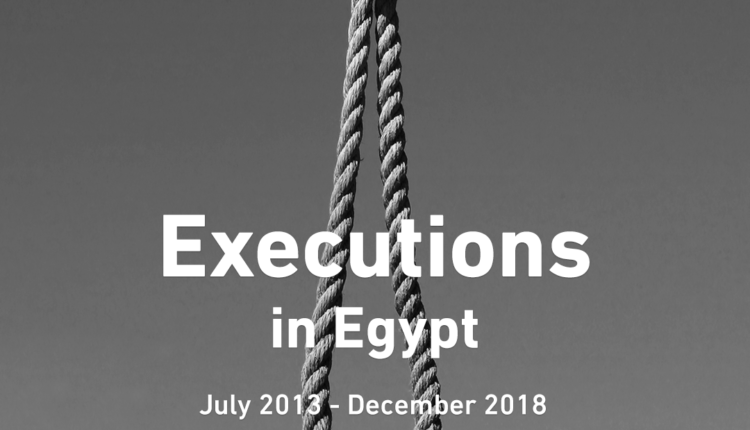Universal Periodic
Review | Egypt | 34th SessionARBITRARY EXECUTION
IN EGYPT
Right To Life
March – 2019
L’organisation ‘ BRUSSELS FOR HUMAN RIGHTS AND DEVELOPMENT BHR AISBL ‘ est une organisation belge indépendante fondée à but non lucratif. L’organisation, basée à Bruxelles, s’occupe de la défense des droits de l ’Homme et du Développement. Elle a été fondée officiellement en 2018 par un groupe de défenseurs des droits de l’homme.
L’organisation travaille pour à ce que tous les individus au Moyen-Orient et en Afrique du Nord jouissent de la justice et de la liberté sous la protection de la loi et les principes de la démocratie, tout en participant à l’amélioration et au développement de la société à travers le Comité africain des droits de l’homme et des peuples.
An independent human rights foundation aims at supporting and protecting justice and human rights. It operates according to the rules, mechanisms and systems of the international organizations and has a significant partnership with the concerned organizations.
The Foundation aims to protect and promote human rights, in accordance with the international standards adopted by the United Nations and the relevant international covenants and conventions, and to support and defend the oppressed.
Introduction:
Arbitrary execution is a description of official State killings, whether by direct killing or summary executions that violate the standards and guarantees of fair trials; the protection of human rights must be the principal objective of all political systems. The purpose of this report is to highlight the death penalty in Egypt, especially arbitrary executions during the four years 2014-2018, which threaten the right to life.
Overview of the death penalty in Egypt from 1981 to 2018:
Unofficial statistics by number of civil society organizations, that monitored the death penalty in Egypt, indicate the issuance of death sentences as follows:
From 1981 to 1990, there were “179” death sentences and 35 people were executed.
From 1991 to 2001, there were at least “678” death sentences and 213 people were executed. In 1999 alone, at least 108 people were sentenced to death, including 12 women.
From 2002 to 2006, 280 death sentences were handed down in Egypt.
In 2007, more than 40 death sentences were handed down.
In 2008, at least 87 death sentences were handed down.
In 2009, at least 269 death sentences were handed down.
In 2010, 185 death sentences were handed down.
In 2011, 123 death sentences were handed down.
In 2012, 91 death sentences were handed down.
From 2013 to 2018 more than 1,500 death sentences were handed down.
Death penalty in Egyptian legislation:
The death penalty and its application in Egypt constitute a threat to the human right to life, especially with the existence of more than 105 criminal offences are punished by execution, as stipulated in Egyptian Penal Code No. 58 of 1937, Military Provisions No. 25 of 1966 and Arms and Ammunition Act No. 394 of 1954, And the anti-terrorism Act No. 94 of 2014 and the Anti-Narcotics Act No. 182 of 1960. The crimes that entail the imposition of the death penalty are not precise and could be open to interpretation, leading to the arbitrariness of the issuance of these provisions, as well as the extension of the Egyptian legislator of the death penalty to entail other crimes that don’t fall within the scope of the most serious crimes.
Death penalty and the Islamic law:
The Egyptian government always invokes Islamic law when addressing the abolition of the death penalty, reducing it or replacing it with another punishment, while we find that Islamic law seeks to prevent all kinds of punishments which are well below the death penalty, where there is in the principles of Islamic law an explicit statement that says: “No penalty (is given) on suspicious proof” – the suspicious proof means – a flaw in the absolute certainty of the matter, if the suspicious proof exists then the penalty must be stopped against this specific subject or crime.
The principle of “self-preservation” has always been defined in the principles of Islamic law, that is to say, to prevent the human spirit from being lost and to seriously seek the prevention of the death penalty. This is in keeping with article 3 of the Universal Declaration of Human Rights, stated as The right to life.
Death sentences in Egypt during the four years preceding the universal periodic review:
Through monitoring and documentation,
we found that the death sentences in Egypt are mostly issued by an exceptional
and abnormal courts, known as the Terrorism Chambers or Military Justice, as
follows,
The Egyptian Constitution of 2014
states in article 97 that “no person shall be tried except in front of his
natural judge and that exceptional courts are prohibited”. On 23 December,
the Egyptian Minister of Justice issued Decree No. 10412 of 2013 to allocate
criminal services to the consideration of terrorism cases. On 26 December, the
President of the Appeal Court of Cairo decided to set up special chambers in
Cairo composed of judges from the criminal courts, called the Terrorism
Chambers, in contravention of the General Assembly’s decision to distribute
judicial work in accordance with the Judicial Authority Law No. 46 of
1972. Moreover, each Appeals Chamber at
the level of the Republic has allocated one or more departments to deal with
terrorism cases. The decision to choose a particular court or judge to consider
a particular case is illegal and represents a waste of the original basis of
the Egyptian judiciary and the judiciary law. These courts have issued harsh
sentences of both imprisonment and execution.
Military courts -the military
judiciary- in Egypt that had a large share in the issuance of death sentences
are actually exceptional courts, composed of military personnel, for the
consideration and adjudication of crimes referred to it by the Public
Prosecution or the Military Prosecution according to law No. 136 of 2014, on
the protection of public and vital installations, and the subordination of
crimes related to it to the military judiciary, in violation of the provisions
of Article 204 of the Egyptian Constitution 2014.
From March 2015 to February 2016, JHR noted that the Egyptian authorities carried out the death sentence of 52 people, who were sentenced to death from exceptional judicial and military courts mentioned in the previous paragraphs, while 48 people – We have documented information that they will be executed in the coming days – as a result of judgments issued by the same courts referred to in this report.
Death sentence lack fair trial guarantees
While
reviewing the death sentences in cases of a political nature, we found that
these sentences lack the following guarantees:
Deprive
from being tried before the natural independent judge, whereby:
Death sentences by exceptional courts known as “Exceptional terrorist circuits that are formed in contrary to the Egyptian Constitution and the Deposition To Whom It May Concern
Sentences by the Military Courts
Sentences based on the National Security officers of the Interior Ministry investigations, while the death sentenced should be handed down when the tribunal has no doubt the defendant committed the crime through facts and evidences.
Death sentences against citizens who were forced to confess crimes under torture, in contrary to the Article 14-3 (g), which stipulates: “Not to be compelled to testify against himself or to confess guilt”
Sentences against individuals subjected to Enforced disappearances, arbitrary detention, and torture.
Sentences
against individuals deprived from the right to defense, while being
investigated before the Public Prosecution.
Violation
of the right of defense in many cases, as follows:
The defendants were not allowed to get defense witnesses, there were only the prosecution witnesses, most of them are officials of the Executive Authority.
Failure to respond to defense requests, in respect of technical evidence, and request the recall of competent experts.
Failure to enable the defense to seek a review of cases in which civilians are tried before military courts.
The trial sessions are held at the headquarters of the Ministry of the Interior (the police authority). The trial sessions are still held outside the courts, either at the police academy or in the police secretaries’ institute in Tura, south of Cairo, since July 2013.
Mass Death sentences in Egypt
During
the last four years, nineteen judges in unfair mass trials handed down 1056
death sentences.
200
death sentences were handed down against civilians by the military exceptional
courts, which is not internationally recognized.
A
statement of the names of judges and the number of sentences they handed down:
In the first place comes Judge “Mohammed Nagy Shehata” that handed down (263) judgements.
In the second place comes Judge “Said Sabry” who handed down (220) death sentences, he is the highest ever judge to refer cases to the Mufti, (683) defendants were referred in the case known as “Al-Adwa incidents in Minya governorate-Upper Egypt”, then he sentenced (183) citizens to death, after creating a stir in Egypt and the world.
In the Third place comes Judge “Shaaban Al-Shamy” who handed down (160) death sentences.
In the Forth place comes Judge “Hassan Farid” who handed down (147) death sentences.
In the Fifth place comes Judge “Mohammed Sherin Fahmy” who handed down (46) death sentences.
In the Sixth place comes Judge “Said Youssef Saad” who handed down (37) death sentences, he previously referred (528) citizens to the Mufti in the case known as “Matay incidents”
In the Seventh place comes Judge “Moataz Khafagy” who handed down (30) death sentences.
In the Eighth place comes Judge “Osama Abdelzaher” who handed down (26) death sentences.
In the Ninth place comes Judge “Salah Heriz” who handed down (21) death sentences.
Judge “Shabib Al-Damarany” also handed down (21) death sentences.
In the Tenth place comes Judge “Alaa Shogaa” who handed down (18) death sentences.
In the Eleventh place comes Judges “Nabeel Salib” and Judge “Farhan Batran” each with (12) death sentences.
In the Twelfth place comes Judge “Hussein Kandil” who handed down (11) death sentences.
In the Thirteenth place comes three Judges, each handed down (8) death sentences, namely: Judge “Fathy Al-Baioumy”, Judge “Hefny Abdelfatah” and Judge “Abdalla Abdelsamia Abdelrahman Salem”.
In the Sixteenth place comes Judge “Fetouh Elsayed Allam” who handed down (5) death sentences.
In the Seventeenth place comes Judge “Gamal Aqrab” who handed down (3) death sentences.
In
a positive precedent on the legal and judicial level in Egypt over the past
years, specifically on February 27, 2019, a military appeals chamber accepted a
petition by the two sentenced to death, Ahmad Amin Ghazali and Abdel Raouf
Abdel Basir, case No. 174 of 2015 Military – The military court ruled to
abolish the death sentence and replace the sentence with life imprisonment
instead of execution. We mention this positive incident because dozens of
civilians were executed before their appeals were viewed by the military
courts.
Some of the Irrevocable Death sentences:
| No | Case Known as | Case no. | Governorate | No. of sentenced |
| 1 | Killing the guard | 16850 of 2014, Mansoura felonies | Dakahlia | 6 |
| 2 | Bibliotheca Alexandria | 20091 of 2014 Bab shark felonies | Alexandria | 2 |
| 3 | Fadl Almawla | 1781 of 2014 East of Alexandria felonies | Alexandria | 1 |
| 4 | Communication with Qatar | 315 of 2014 High state security felonies | Cairo | 3 |
| 5 | Port Said Incident | 437 of 2012 Port Said felonies | Port Said | 10 |
| 6 | Matay | 1824 of 2013 North of Minia | Menia | 6 |
| 7 | Kirdasa incidents | Case no.12749 of 2013 Kirdasa center felonies registered under 4804 of 2013 North Giza | Giza | 20 |
| Total | 48 |
Recommendations
Abolishing the death penalty in Egypt.
Stopping the execution of final death sentences issued in violation of fair trial guarantees.
Cease the trial of civilians before military courts.


 العربية
العربية
Comments are closed.